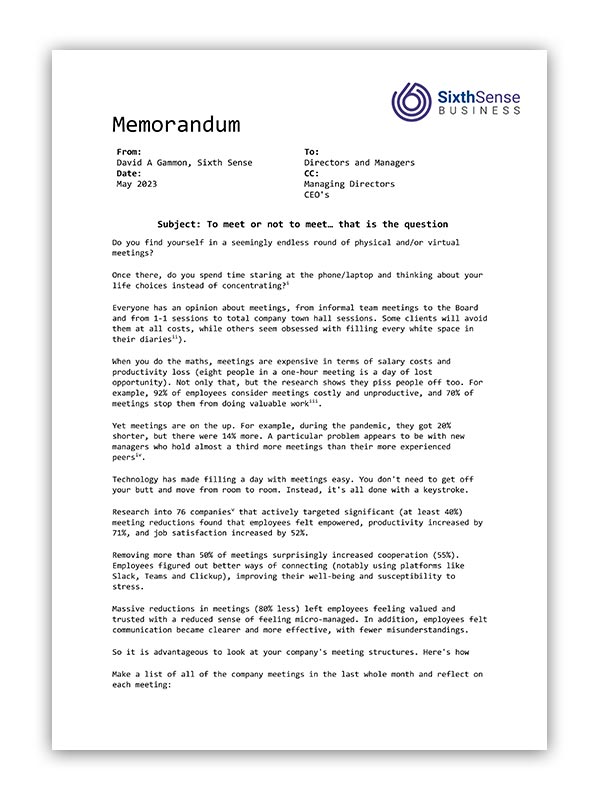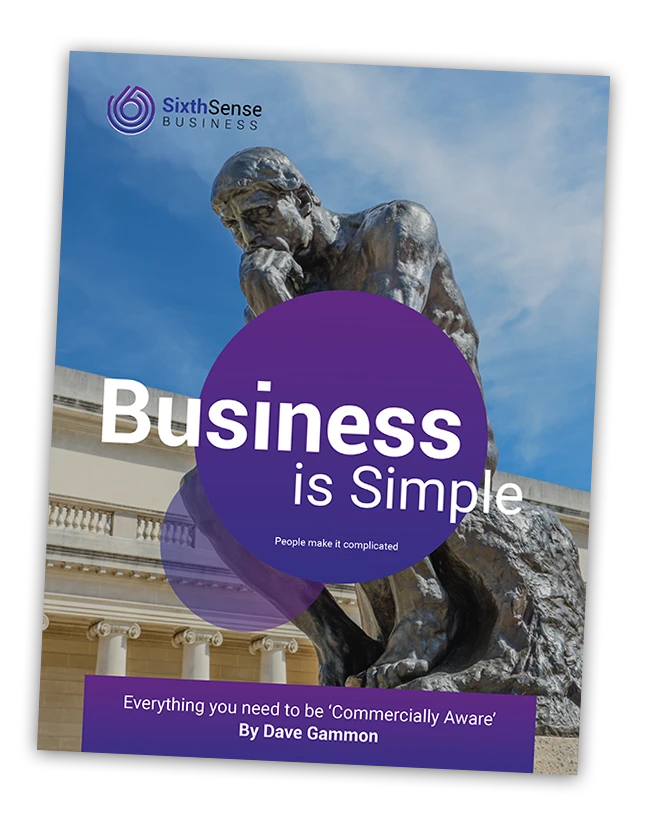From:
David A Gammon, Sixth Sense
Date:
May, 2023
To:
Directors and Managers
CC:
Managing Directors
CEO’s
Do you find yourself in a seemingly endless round of physical and/or virtual meetings?
Once there, do you spend time staring at the phone/laptop and thinking about your life choices instead of concentrating?
Everyone has an opinion about meetings, from informal team meetings to the Board and from 1-1 sessions to total company town hall sessions. Some clients will avoid them at all costs, while others seem obsessed with filling every white space in their diaries).
When you do the maths, meetings are expensive in terms of salary costs and productivity loss (eight people in a one-hour meeting is a day of lost opportunity). Not only that, but the research shows they piss people off too. For example, 92% of employees consider meetings costly and unproductive, and 70% of meetings stop them from doing valuable work.
Yet meetings are on the up. For example, during the pandemic, they got 20% shorter, but there were 14% more. A particular problem appears to be with new managers who hold almost a third more meetings than their more experienced peers .
Technology has made filling a day with meetings easy. You don’t need to get off your butt and move from room to room. Instead, it’s all done with a keystroke.
Research into 76 companies that actively targeted significant (at least 40%) meeting reductions found that employees felt empowered, productivity increased by 71%, and job satisfaction increased by 52%.
Removing more than 50% of meetings surprisingly increased cooperation (55%). Employees figured out better ways of connecting (notably using platforms like Slack, Teams and Clickup), improving their well-being and susceptibility to stress.
Massive reductions in meetings (80% less) left employees feeling valued and trusted with a reduced sense of feeling micro-managed. In addition, employees felt communication became clearer and more effective, with fewer misunderstandings.
So it is advantageous to look at your company’s meeting structures. Here’s how
Make a list of all of the company meetings in the last whole month and reflect on each meeting:
- Did everyone that attended the meeting REALLY need to be there (or there for the entire session)?
- How much did the meeting cost (time and money)?
- Did the meeting need to be that long? Imagine you had no choice but to half the time of the meeting. How would you organise it and control the contributions of individuals then?
- Was an agenda circulated sufficiently in advance to enable people to gather data and their thoughts?
- Was there a clearly understood outcome for the meeting and distributed minutes of the discussion with a list of clean actions?
- If you had made participation voluntary, would all invitees have come along?
- Could the meeting have been replaced by the circulation of reports from the various parties and collaborative technology used for updates, questions or comments?
If the answer to these questions is no, the meeting should be eligible for major surgery or on the ‘kill’ list.
While the research is clear, it is contextual, so you’ll need to figure out what works for your organisation.
In fact, the advantages of no-meetings plateau after reducing them by around 60% and then falls off a cliff. Satisfaction, productivity, engagement, and cooperation decline when meetings are obliterated.
With traditional meetings yielding little return on time investment, the opportunity cost is too high not to act now. Your teams are full of capable people who need the space to perform.
Spend time looking at how they want to collaborate and build a meeting plan that is fit for purpose. Nothing more and nothing less than necessary.
[i] I was on a conference call with a bunch of France Telecom executives when someone fell asleep and started snoring down the phone.
[ii] maybe this is a proxy for feeling busy in the old fashioned work ethic way.
[iii] Of course, we have to remember that some people will whine about meetings and whine about lack of communication.
[iv] Presumably, because they feel more pressured to connect with their teams and be seen to be busy managing.
[v] ‘Dear Manager, you are holding too many meetings’ – Harvard business review March 2022.
[vi] A clean action has an owner, a timeline, a rationale, and a specified/understood activity.
[vii] I like one idea I read about where meetings are only permitted on certain days of the week.

